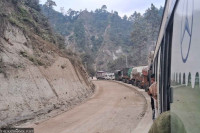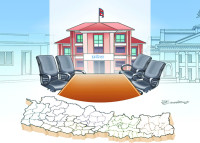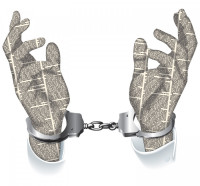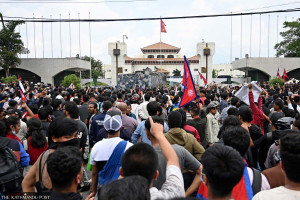Opinion
Internal divide
Splits in the indigenous movement in Nepal could jeopardise the achievements of Janajati politics
Tashi Tewa Dolpo
Ever since the formation of a unitary state, Nepal has faced multiple problems. The country marginalised the Janajatis, Dalits, Madhesis, Muslims and women, primarily using the Muluki Ain and ‘Ek Bhasa, Ek Bhes’ policy. But these excluded groups, by continuously championing for their own rights in national politics, have succeeded in increasing their social consciousness and in moving towards political awareness. In recent times, however, political awareness, has taken a backseat as such marginalised communities have continuously failed to maintain unity among the diverse groups in it. This has also resurfaced within the indigenous movements, mainly led by the Nepal Federation of Indigenous Nationalities (Nefin), an umbrellla organisation of 58 indigenous communities, and Adivasi Janajati Rastriya Andolan (Ajra) led by Padma Ratna Tuladhar through partisan politics.
Janajati netas
The Janajati movement consists of several leaders who were also members of mainstream parties even when they held significant positions in Nefin. Suresh Ale Magar, one of the founding members and the first General Secretary of Nefin was a member of then CPN (Maoist). Likewise, Om Gurung was a member of Rastriya Janamorcha during his time as General Secretary of Nefin. Pasang Sherpa, Chairperson of Nefin, was close to the CPN- UML. Likewise, Raj Kumar Lekhi, who was also a member of the UML, was elected as chairperson of Nefin. A year after his chairmanship, he opened Nepal Nagrik Party. Similarly, the current Chairperson Nagendra Kumar Kumal, has confirmed in most of his interviews that he is close to the Nepali Congress (NC).
Yet, some of the significant achievements of these office bearers of Nefin despite their political ties are: the signing of a 20 point and a nine point agreement in 2007 and 2012 respectively. Some of the members of Nefin were selected in the first Constituent Assembly (CA) under the proportional representation system. Pasang Sherpa and Tashi Sangmo Gurungseni ‘Baragaunle’ were selected by the UML. Ram Bahadur Thapa Magar, who was General Secretary under Sherpa in Nefin, was selected by the CPN (Maoist). Likewise, Bhim Raj Rajwanshi, an accountant under Sherpa, was selected by Madhesi Janaadhikar Forum Loktantrik.
However, even when there were more than 25 janajatis in the first CA, who also went on to form a Janajati caucus, their achievements were minimal. The Assembly was clearly limited to the discussions held among the top and old political leaders, mainly Pushpa Kamal Dahal, late Girija Prasad Koirala and Jhala Nath Khanal. And most of the Janajati leaders in the first CA were accused of amassing a lot of wealth by their own communities. Their association with various political factions, furthermore, has not really helped the Janajati movements’ agendas. The agendas of identity-based federalism and self-determination rights have now been clearly rejected by both NC and UML. And the Janajatis within those parties have not yet confirmed their support to Ajra.
Majority rules
Under the Adivasi Janajati classification in Nepal, there are more than twenty groups which are small in number and have a low socio-economic status. Some of them are placed under highly marginalised and endangered groups. They are: Majhi, Siyar, Lhomi, Thundam, Dhanuk, Chepang, Santhal, Jhagad, Thami, Bote, Danuwar, Baramu, Kusunda, Bankariya, Raute, Surel, Hayu, Raji, Kisan, Lepcha, Meche, and Kuswadiya. Thus, Nagendra Kumar Kumal, is not only the youngest but also the first Chairperson of Nefin to come from one of these marginalised groups. Before Kumal, the posts of general secretary and chairperson of Nefin were held by people from the Gurung, Sherpa, Limbu, Magar and Tharu communities.
Many minorities within the Adivasi Janajati argue that the majority politics also prevails among Janajati groups. This holds true mainly in the socio-cultural development programs carried out by the National Federation for Development of Indigenous Nationalities (NFDIN) which has the prime minister of Nepal as its chairperson. These minorities complain that high budget programs are mostly provided to groups such as Magar, Rai, Limbu, Newar, Tamang and so on. Norbhu Ghale Dolpo, former vice-president of Nefin, asserts that the socio-cultural aspects of Janajati minorities are overshadowed by the majority’s practices.
Pemba Gurung Bhote, current General Secretary of Nefin, was selected by UML in the second CA. After his selection and his subsequent absence from the Ajra declaration program, Pemba Gelu Sherpa, a Secretary at Nepal Sherpa Association, questioned Bhote’s secretarial position at Nefin and his association with the UML. Though Bhote was present in the first meeting organised at Tamu Hyula Choj Dheen, he was absent from the next program as Nefin had not officially decided whether to support Ajra or not. According to Sherpa, the problem persisted between the two as Bhote threatened Sherpa after the latter’s remarks.
Dissenting voices
Recently, Raj Kumar Lekhi, the current advisor and former chairperson of Nefin, in a recent interview with the Post (‘One or two provinces in the Tarai is unacceptable, November 10, Page 6) stated that Hill Janajatis have overshadowed the issues of minorities. He reemphasised the divisions within the Janajati movement and questioned Ajra’s motives for ‘seeking Baise-Chaubise Rajya of single ethnic groups’.
Whether it’s the rise of indigenous activism and politics across Latin America or India, there have always been intra-group struggles. In Nepal, even as the Janajati activism became more centralised along with its relation with mainstream politics, only a few of the people among the Janajati groups have benefited. Nefin and Ajra should realise that internal understanding and unity are necessary to successfully pressurise the majority elites of NC and the UML to enact an inclusive constitution. If this fragmentation in identity politics persists, it will not only assist the ruling parties to promulgate their own constitution. Additionally, it will further jeopardise the achievements of Janajati politics too.
Tewa Dolpo is a Research Assistant at the Nepa School of Social Sciences




 16.57°C Kathmandu
16.57°C Kathmandu












